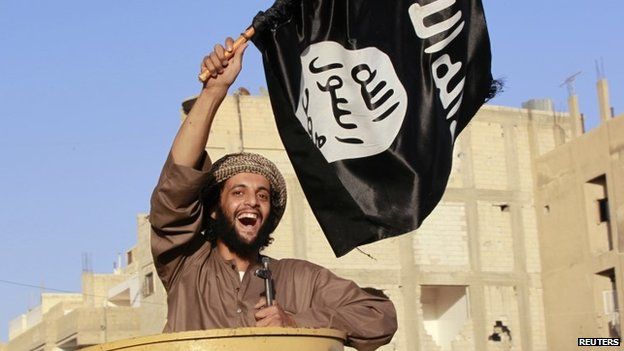While Iraq burns, Isis takes advantage in Syria
- Published

The Islamic State (Isis) may be many things, but foolish is not one of them.
While international attention has been fixated on the disintegration of Iraq and the expansion of the so-called caliphate of Abu Bakr al-Baghdadi, the Sunni insurgents have moved their offensive back into Syria with a newly acquired haul of US-made weapons and cash.
Cushioned by the impunity offered them by a largely unresponsive international community, and the inability of the Syrian and Iraqi armies to defeat them in battle, Isis' latest advances in Syria have further destabilised the already frail dynamics in the region.
As Bashar al-Assad attended his de-facto self-coronation affording him another seven years in power, Isis was making a mockery of the president's pledge to "not stop fighting terrorism and striking it wherever it is until we restore security to every spot of Syria".
In addition to Isis, Syria's Kurds have also been busy establishing their own cantons of self-governance, backed by their militia force, the People's Protection Units (YPG). But as their control over Kurdish areas of Syria has strengthened, it has brought them into fierce conflict with Isis.
Upgrade in firepower
While in neighbouring Iraq the Kurdistan Region remains largely insulated from Isis' violent land-grabbing operations, Syria's approximately two million Kurds have borne the brunt of the expanding "caliphate" declared at the end of June.
On 2 July, Isis fighters targeted villages west of Kobane in Aleppo province.
A Kurdish-majority region, Kobane was captured by the YPG in July 2012 and subsequently declared an autonomous canton by the Democratic Unity Party (PYD).
While this is not the first time Isis has attempted to assimilate Kobane into the territory under its control, having threatened to do so in March, the ongoing attacks are notable for the stark upgrade in firepower used by Isis against the Kurdish forces.
In a symbolic show of the new regional realities since the capture of the northern Iraqi city of Mosul last month, Isis has made use of the weapons it seized from the Iraqi army in its successful takeover of large swathes of the country, including an estimated 1,500 Humvees, some armed with TOW missiles, howitzers, and precision-guided weaponry.
"The attacks from Isis have reached an acute level following their recent acquisition of heavy artillery," warned the presidency of the three Syrian Kurdish cantons.
'Chemical weapon'
While the YPG claims that Isis used chemical agents in its recent attacks on Kobane - allegedly seized at the Muthanna chemical weapons facility near Baghdad - legitimacy of the photographic and medical evidence provided by Kurdish forces has yet to be confirmed by international players.
The US also downplayed Isis' takeover of the Muthanna facility on 8 July, claiming the weapons were no longer intact and would be impossible to use.
"Chemical weapons have been used, we have taken samples for testing in Diyarbakir. It is some kind of… chemical weapon but we are not sure exactly," said the leader of the PYD, Salih Muslim.
YPG spokesperson Redur Xalil called on the international community to "intervene immediately and carry out their duty toward Kobane", in a bid to alert the world of the unspoken battle that is being waged against Syria's Kurds.
The sharp upswing in fighting in Syria is a cause for alarm, particularly in neighbouring Turkey, which has cause to worry about the increasing militarization of Kurdish areas, as the YPG struggles to fight an emboldened Isis.
"We know that some 300-400 Turkish Kurds are fighting with us in Syria against Isis," said Mr Muslim. "It is very difficult. We are short on weapons and our rocket-propelled grenades are not effective against [Isis'] tanks."
Turkey is faced with a conundrum whereby the PYD - which is closely linked to Turkey's decades-old enemy, the Kurdistan Workers' Party (PKK) - is also preventing the militant Islamist force from destabilising its own border regions.
According to Turkey expert and associate fellow at the Royal United Services Institute (RUSI,) Aaron Stein: "It is unclear as to what Turkey's policy is. The rise of Isis has been a game changer for them."
"But I haven't yet seen evidence that Turkey supports Isis against the YPG. All evidence I have uncovered says they're not directly supporting them."
What Turkey decides will have a huge impact on the direction of the conflict in Syria.
None of the three major players - the Syrian regime, Isis, or the PYD - are particularly palatable to Ankara, but choices must be made.
It may be that Ankara must recognise the de facto break-up of Syria into three distinct governing structures, and preventing radicalisation of Kurds fighting Isis is its main security priority.
As the conflict in Syria heats up, fuelled by Iraq, Turkey may well find it plays a double game of supporting the Kurds but only just enough to ensure that they do not lose. Either way, more war will surely come.
Michael Stephens is the Director of RUSI Qatar (Twitter: @MStephensGulf). Sofia Barbarani is a freelance journalist based in Iraqi Kurdistan (Twitter: @SofiaBarbarani)